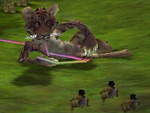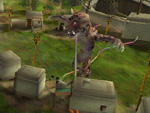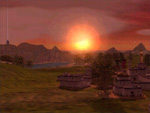Early Hours with…Black & WhiteMark's Comments: The buzz about the game is centered around the creature, your avatar in the world, and the open-endedness of the game. The buzz is deserved. The creature seems capable of real feelings and can learn, which is a testimonial to the AI that Lionhead labored to implement in the game. It really is rather amazing to see the wide range of reactions and learned responses your creature is capable of. That said, I'd be more impressed if the creature could play me in Starcraft and exhibit creative problem-solving during the course of the game. I'm just not interested in a virtual pet, which is what Black & White really seems to be about. And the game is open-ended in the way you can play it. You can be good or evil or something inbetween. It's not like Baldur's Gate that purported to allow you to be good or evil but still just gave you one path through the game. Black & White lets you solve problems in multiple ways. The game itself is beautiful to look at. It's one of the better 3D engines we've seen for a game that at least looks a lot like a strategy game, even though it may be something else.
I didn't like training my creature. Besides the element of tedium involved, I felt like a sadistic wretch having to beat it senseless to keep it from crapping all over the village. Perhaps this is a small triumph for the developers, making me care this way, but it made me dislike that aspect of the game. I don't really feel much like a god in this game. I feel more like a babysitter. I have to work a lot harder than a god should have to work. Why should I have to hunt for sheep? Some of the quests are tedious. The interface is novel, but Lionhead carries the god conceit a bit too far. Having to move the camera by grabbing the land and pulling is annoying. Yes, I know you can remap the keys and go to the WASD setup, but all Lionhead really needed to do was make the camera pan forward when I moved my mouse to the top of the screen, and so on. Why they didn't is a mystery. It seems like they were determined to do things differently, for good or ill effect. The save system's a bit of a mess, a real brain twister when you try to figure out what's going on. It saves in separate files the game state, the creature state, and your god state (how good or evil you are). It gets weird when you play a multiplayer or skirmish game in the middle of playing the single-player game. While it's possible to use a save game to reload a previous game state, it seems impossible (at least as far as I've seen) to restore your creature or your god state. Then the cherry on top of this banana split is the increasing amount of time it takes to save a game, upwards of a minute after awhile. The game itself is quite polished, but has some strange lapses. For instance, the tutorial is plodding enough the first time through, yet strangely the game forces you to play through it each time you start a new game. Perhaps the biggest oversight is the lack of a sandbox mode, which Lionhead has promised to patch in. The whole game feels more like a sandbox than a game, yet we can't play it that way. Ultimately, the gameplay is just a new take on Populous. It has a tacked-on feel, like it was the last thing Molyneux and company worried about because they were too enamored of the idea of creating believable creature AI and a game that would let the player be either good or evil. I couldn't help but think about how Sid Meier would have approached something like this. Meier seems to focus on the gameplay early on, banging on it and making sure that it's pre-eminent, while Molyneux seems to focus on the game's high concept first and foremost. It's as if Molyneux is a bit bored with worrying about gameplay and is looking to create something new to hold his interest, a game that's more than a game. He may have done just that, but while Black & White may be a fascinating toy, it just doesn't seem like much of a game to me.
Tom's comments Back to Early Hours April 13, 2001 |
|||


